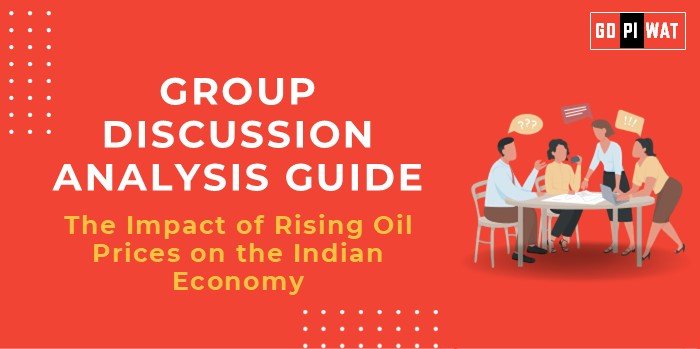📋 GD Analysis Guide: The Impact of Rising Oil Prices on the Indian Economy
🌐 Introduction to the Topic
Opening Context: “Rising oil prices have a ripple effect on economies worldwide, especially in energy-dependent countries like India. The phenomenon influences not just fuel costs but the broader inflation, fiscal health, and trade dynamics, making it a crucial discussion point for economic and policy debates.”
Topic Background: Oil prices are highly volatile, influenced by global supply-demand imbalances, geopolitical tensions, OPEC’s production decisions, and recent factors like the Russia-Ukraine conflict. For India, which imports nearly 85% of its oil needs, these fluctuations have deep-rooted economic implications, from government subsidies to trade deficits.
📊 Quick Facts and Key Statistics
📈 Impact on Inflation: A $10 per barrel increase in crude oil prices can raise India’s retail inflation rate by approximately 0.49%.
📉 Fiscal Deficit Influence: Such an increase can widen the fiscal deficit by about 0.43% of GDP if the government absorbs the entire price shock.
🚛 Transport Sector Consumption: The transport sector accounts for over 40% of India’s oil consumption.
📉 Recent Price Trends: Brent crude prices have experienced significant volatility, impacting India’s import bills and economic stability.
🏢 Stakeholders and Their Roles
- 📜 Government: Implements policies to mitigate the impact of rising oil prices, such as adjusting excise duties and managing subsidies.
- 💼 Oil Marketing Companies (OMCs): Responsible for pricing and distribution of petroleum products, directly affecting consumer prices.
- 👨👩👧👦 Consumers: Face increased costs for transportation and goods, leading to reduced disposable income and altered consumption patterns.
- 🌍 Global Suppliers and OPEC: Their production decisions influence global oil prices, affecting India’s import costs.
- 🏭 Businesses: Experience higher input costs, particularly in sectors like transportation and manufacturing, impacting profitability.
🏆 Achievements and Challenges
🎯 Achievements:
- 📦 Strategic Petroleum Reserves: India has developed reserves to manage short-term supply disruptions.
- 💰 Fuel Subsidy Rationalization: Efforts to reduce subsidies have aimed to control fiscal deficits.
⚠️ Challenges:
- 📈 Inflationary Pressures: Elevated oil prices contribute to higher costs of goods and services, affecting consumers.
- 📉 Fiscal Strain: Increased import bills can widen the fiscal deficit, limiting government spending on other sectors.
🌍 Global Comparisons:
Oil-dependent economies like India face more acute challenges compared to oil-rich nations such as Saudi Arabia.
📋 Case Studies:
Kerala’s Initiative: The state has introduced electric buses to reduce dependency on fossil fuels in urban areas.
📢 Structured Arguments for Discussion
Supporting Stance: “Rising oil prices incentivize the shift to renewable energy, promoting innovation and reducing carbon emissions in the long term.”
Opposing Stance: “India’s high dependence on oil imports makes the economy vulnerable to price hikes, adversely affecting fiscal health and household budgets.”
Balanced Perspective: “While rising oil prices present short-term economic challenges, they also underscore the urgency of diversifying India’s energy portfolio and investing in renewables.”
💡 Effective Discussion Approaches
- 📊 Statistical Impact: “With 87.7% dependency on imports, India’s exposure to rising global oil prices significantly impacts inflation and economic stability.”
- 📑 Policy-Based Opening: “Government measures, such as excise duty adjustments and strategic reserves, highlight India’s efforts to mitigate oil price shocks.”
Counter-Argument Handling: “While rising prices pose challenges, they offer opportunities for greater investments in clean energy alternatives, reducing long-term dependency.”
📋 Strategic Analysis of Strengths and Weaknesses (SWOT)
- 💪 Strengths: Development of strategic reserves, policy measures to control inflation.
- 🛑 Weaknesses: High import dependence, fiscal deficit strain due to increased import bills.
- ✨ Opportunities: Push for renewable energy adoption, promotion of electric vehicles.
- ⚡ Threats: Geopolitical tensions affecting supply, unstable global oil prices impacting economic stability.
📚 Connecting with B-School Applications
Real-World Applications: Energy cost management in businesses, strategic investments in renewable energy, and formulation of policies to mitigate economic impacts of oil price volatility.
📝 Sample Interview Questions:
- 🤔 “What strategies should India adopt to minimize its dependency on imported oil?”
- 📊 “How do rising oil prices impact inflation and business profitability?”
Insights for B-School Students: Understanding macroeconomic trends, fiscal policy implications, and developing sustainable business strategies in response to energy price fluctuations.


